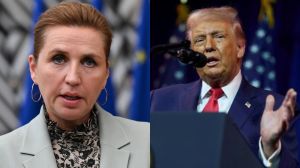The face behind The Voice
Christina Aguilera,with a flop album and an awkward Super Bowl performance,has single-handedly reshaped music reality shows
Years from now,Christina Aguilera will be remembered for her glamour,her scandalous take on femme-pop and her voice. But she should also be remembered as the person who almost single-handedly reshaped music-competition reality programming. Her legacy as a judge on The Voice,may well turn out to be deeper and more profound than the one shes forged in her music career.
Securing Aguilera in 2011 was a coup for a show that needed to differentiate itself from Foxs American Idol,which had just signed Steven Tyler and Jennifer Lopez as judges.
Tyler and Lopez were past their fertile period as hitmakers. Aguilera had been in the Billboard Top 10 as recently as 2008. Of the four mentor-judges of The Voice,she was the one most obviously slumming it,even though she was coming off a bumpy professional period: a flop album,Bionic; an awkward and sloppy rendition of the national anthem at the 2011 Super Bowl; and an arrest on a charge of public intoxication.
But Aguilera was an undeniable contemporary pop star. Broadly speaking,its because of Aguilera that it was announced that Nicki Minaj and Keith Urban,contemporary hitmakers,would become part of the Idol judge panel. They replace Tyler and Lopez. They join Mariah Carey,and is now the panels unlikely eminence grise,and Randy Jackson,the lone holdover from Idol 1.0.
Aguileras shadow also extends over The X Factor,that last week gave its new judge-mentor panel its debut: the two older male executives,L.A. Reid and Simon Cowell,remain from Season 1,but the two women,Paula Abdul and Nicole Scherzinger,have been replaced by more current names: the former Disney star Demi Lovato and the former Aguilera nemesis Britney Spears.
As a group,theyre using these shows not as a platform for stalled-career kick-starting,but as part of a portfolio of activities that reflect current music business realities. Network TV is an extremely dangerous and powerful delivery platform.
The goal of these talent competitions was to build a starthe judges were central to that narrative,but werent meant to create waves of their own. Then Simon Cowell emerged as the great TV villain of the Bush years,and the dynamic tilted.
The Voice was essentially a heavy bet on the Cowell model,which stipulated that the star-making was nice,sure,but it could be complemented by judges with their own narratives of celebrity. And why wouldnt current stars flock to these series? They are ratings kingpins. The music industry is good at anointing stars but doesnt always have the scale to sustain them,especially lately.
And to appear regularly in prime time is an almost certain career boon. For Spears and Lovato and Aguilera before them,the job has also been cleansing,replacing occasionally unsteady public images with those of responsibility and authority.
Last week Aguilera announced a new album,Lotus,to be released in November. In an interview that appeared on Billboards website and was then removed,she indicated that she might be preparing to leave her chair on The Voice,at least for a spell.
Beginning to face questions about whether committing to The Voice means turning your back on your music career,one of the executive producers,Mark Burnett,insisted to Billboard,There will never be anyone getting replaced,ever. Mentors may take seasons off,though,to recharge their batteries,release new music and renew their relevance.
- 01
- 02
- 03
- 04
- 05































